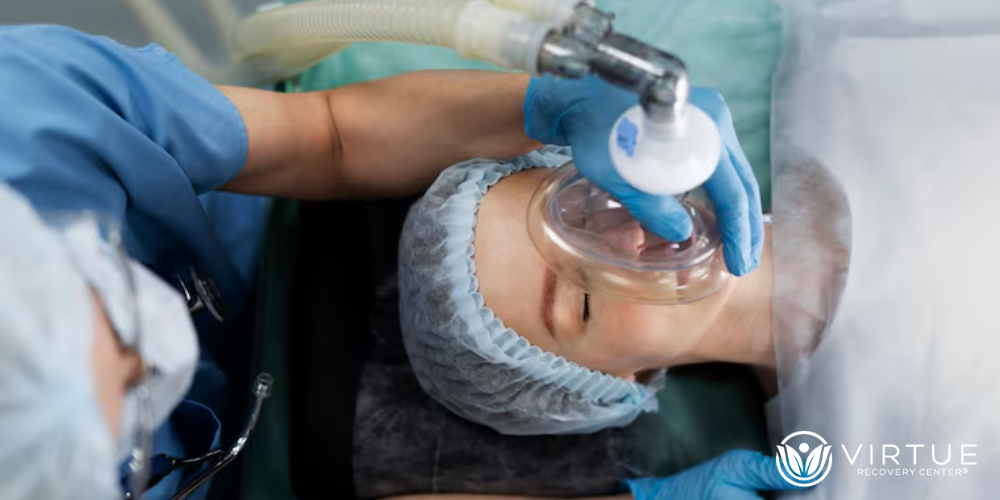Key Takeaways
- Mixing alcohol and Valium (diazepam) can have dangerous effects, such as making it hard to breathe and putting you in a coma.
- A lot of people don’t realize that they are dependent on both benzodiazepines and alcohol, which makes withdrawal harder.
- The safest first step in treating these two addictions is to go through alcohol medical detox.
- If you don’t detox properly, Valium withdrawal can lead to seizures, hallucinations, and heart problems.
- Professional rehab centers offer all-around care, including heroin addiction rehab for people who abuse more than one drug.
Introduction
It’s not just dangerous to mix prescription drugs like Valium with alcohol; it could even kill you. Both of these drugs depress the central nervous system on their own, but when they are mixed, the risk of serious side effects like slowed breathing, unconsciousness, or even death goes up a lot. It’s even more scary that this mix is extremely common among people who are addicted. According to the National Institute on Alcohol Abuse and Alcoholism, mixing alcohol with medications like Valium (diazepam) can cause dangerously intensified effects due to pharmacological interactions.
It’s not easy for people with alcohol use disorder and benzodiazepine misuse to get better. Detoxing from alcohol and Valium at the same time is dangerous for your health in ways that should never be done alone. That’s when alcohol medical detox stops being just a suggestion and becomes a must for staying alive and staying healthy in the long run.
What Makes Mixing Valium and Vodka Extremely Dangerous?
When people mix alcohol and Valium, which is often by accident or to get a stronger high, they are combining two strong depressants. Both drugs work by enhancing the action of GABA, a neurotransmitter that slows down brain activity, thereby increasing its effectiveness. This can help with anxiety for a short time or make you feel calm, but it often leads to dangerously increased sedation. As noted in Substance Abuse Treatment guidelines, these synergistic effects can quickly lead to overdose or death.
The risks go up with higher doses and more frequent use. Users may have:
- Extreme sleepiness
- Coordination problems
- Heart rate slowed down
- Forgetfulness
- In terrible cases, coma or death
Valium has a longer half-life than alcohol, which means it stays in the body longer and makes it more likely that overdose symptoms will show up later. For people who are already addicted to alcohol, even one-time mixing the two can have terrible effects.
What Happens When You Stop Taking Valium and Alcohol?

It can be tough to stop using either Valium or alcohol on their own. However, when both are involved, the symptoms can worsen and become a medical emergency. During withdrawal, the body goes into a hyperactive state because it has gotten used to having these depressants all the time.
Some common signs are:
- Seizures
- Panic attacks
- Insomnia
- Hallucinations
- Increased heart rate and blood pressure
People who try to quit cold turkey at home have a high risk of having fatal seizures. To get through Valium withdrawal, you need more than just medical help. You also need a structured environment where your symptoms are closely watched and controlled. This is why medical detox for alcohol with supervision is so essential for safety.
Who Should Get Alcohol Medical Detox?
People who have a history of drinking alcohol for a long time, especially when mixed with other drugs like benzodiazepines, should think about going through detox. People who have had withdrawal symptoms in the past or who drink every day are at a much higher risk of having problems. You or someone you care about may need detox if you see any of the following:
- Having to drink alcohol or take Valium every day to get by
- Not being able to remember things or blacking out after drinking
- Attempts to quit that didn’t work
Symptoms of withdrawal include shaking, anxiety, and trouble sleeping
A professional alcohol medical detox program looks at each person’s medical history and drug use to make a withdrawal management plan that is unique to them. Some people may also need dual-diagnosis care for anxiety, depression, or trauma.
Can Detoxing From Alcohol Help With Polysubstance Abuse?
Yes, for sure. A lot of people who want to detox from alcohol find that they are also addicted to other drugs, like heroin or Valium. In these situations, the detox team needs to focus on withdrawal symptoms that could be life-threatening while also making a plan for the long term to deal with more substance use.
After stabilization, heroin addiction rehab may come next because it needs its complete treatment plan. Patients who go to facilities that offer both detox and rehab services can smoothly move into long-term recovery without any substance abuse issues being left unaddressed.
Also, people with PTSD or chronic pain, for example, often get treatment for both at the same time to lower the risk of relapse and improve patient outcomes. Medical detox is just the first step; it serves as the foundation for everything else.
What Are the Pros of Going Through Professional Detox Instead of Quitting Cold Turkey?

Choosing professional alcohol medical detox over quitting alone isn’t a sign of weakness—it’s an act of wisdom and self-preservation. Here’s why:
- Monitoring around the clock: quick action in case of seizures, hallucinations, or heart problems.
- Medication-assisted treatment (MAT) helps lessen withdrawal symptoms and stop dangerous problems from happening.
- Emotional support: Therapists and other staff help patients deal with trauma and learn how to cope.
- Nutritional support: Gives back essential vitamins and electrolytes that long-term alcohol use can take away.
- Moving to rehab: After they are stable, patients can continue their care through outpatient or residential alcohol addiction rehab.
Detoxing alone at home often leads to a relapse or an emergency hospitalization. Supervised detox, on the other hand, gives patients a safe, controlled place to heal and get ready for the next step in their recovery.
Conclusion
Many people don’t know that mixing Valium and alcohol is much more common and dangerous than they think. When someone tries to stop using these drugs without professional help, the effects can overlap and cause health problems that could kill them. Alcohol medical detox is a lifesaving link between addiction and recovery, especially for people who have issues with more than one drug.
You’re not the only one who has a problem with alcohol and benzodiazepine addiction. At Virtue Recovery Center, Killeen, we offer medically supervised detox programs, prioritizing your safety, dignity, and long-term well-being. You can begin your recovery journey immediately by calling us at 866-843-0545 and speaking with a care specialist in private.
Frequently Asked Questions
1. Is it possible to die from taking Valium and drinking alcohol?
Yes. The combination can severely depress the respiratory system, leading to unconsciousness, coma, or death, mainly when used in large amounts or over time.
2. How long does it take to detox from alcohol?
Detoxing from alcohol usually takes between 5 and 10 days, depending on the person’s health, how long they have been using alcohol, and whether they are also using other drugs like Valium.
3. Is it that dangerous to stop taking Valium?
Yes. If you stop taking Valium suddenly, you may have seizures, hallucinations, and other severe symptoms. It needs to be stopped under medical supervision.
4. Will detox help if I’m also taking heroin?
Yes. People who are addicted to more than one thing can get help with medical detox programs. Integrated heroin addiction rehab programs deal with deeper issues related to substance use and mental health after detox.
5. What sets Virtue Recovery’s detox apart?
Virtue Recovery Center, Killeen, offers all these services in one place: medical expertise, a caring staff, and personalized treatment plans to help individuals safely detox and begin their long-term recovery.
Resources:
- National Institute on Alcohol Abuse and Alcoholism. Alcohol‑Medication Interactions: Potentially Dangerous Mixes. National Institutes of Health, 2019, https://www.niaaa.nih.gov/health-professionals-communities/core-resource-on-alcohol/alcohol-medication-interactions-potentially-dangerous-mixes.
- O’Connor, Sean J., et al. “Appendix A—Pharmacotherapy: A Guide to Substance Abuse Services for Primary Care Clinicians.” NCBI Bookshelf, U.S. National Library of Medicine, updated 2018, https://www.ncbi.nlm.nih.gov/sites/books/NBK64823/.
- National Institute on Drug Abuse. “Treatment for Stimulant Use Disorders—Managing Co‑Occurring Benzodiazepine and Alcohol Dependence.” NCBI Bookshelf, U.S. National Library of Medicine, 2016, https://www.ncbi.nlm.nih.gov/books/n/tip33v2/ch4/.
- About the Author
- Latest Posts
Gigi Price holds licenses as a Master Social Worker and Clinical Drug Counselor. She completed her master’s degree in Social Work at Texas State University. Over the last decade, Gigi has been dedicated to utilizing evidence-based practices to enhance patient care and treatment planning, resulting in positive, long-term outcomes for patients and their families. Her passion lies in creating a treatment environment where professionals collaborate to bring about positive change and provide a safe, trustworthy therapeutic experience. Patients can be confident in receiving top-quality care under her leadership.
In her role as the Clinical Director of Virtue Recovery Houston, Gigi conducted research to identify the most effective approaches for treating patients with acute mental health diagnoses, PTSD, and Substance Use Disorder. She then assembled a team of skilled clinicians who could offer various therapeutic modalities, such as Cognitive Behavioral Therapy (CBT), Dialectical Behavioral Therapy
(DBT), Acceptance and Commitment Therapy (ACT), Somatic Exposure, Eye Movement Desensitization and Reprocessing (EMDR), and Cognitive Processing Therapy (CPT). Gigi takes pride in overseeing the development and implementation of Virtue Houston’s Treatment Program, which includes two specialized therapeutic curricula tailored to the unique needs of individuals struggling with mental health issues, addiction, and PTSD.












